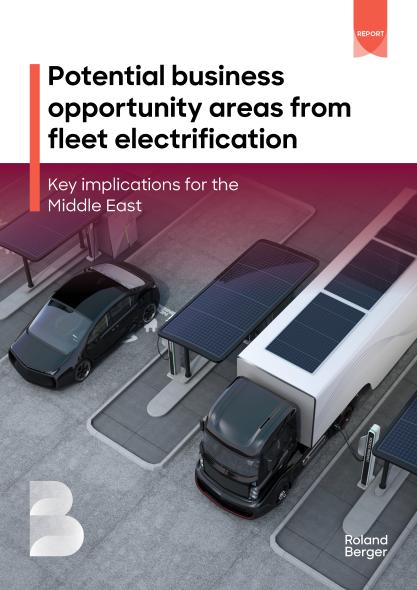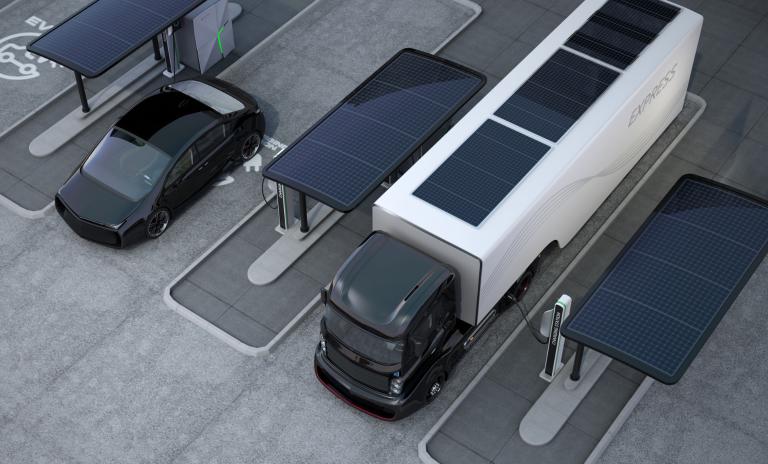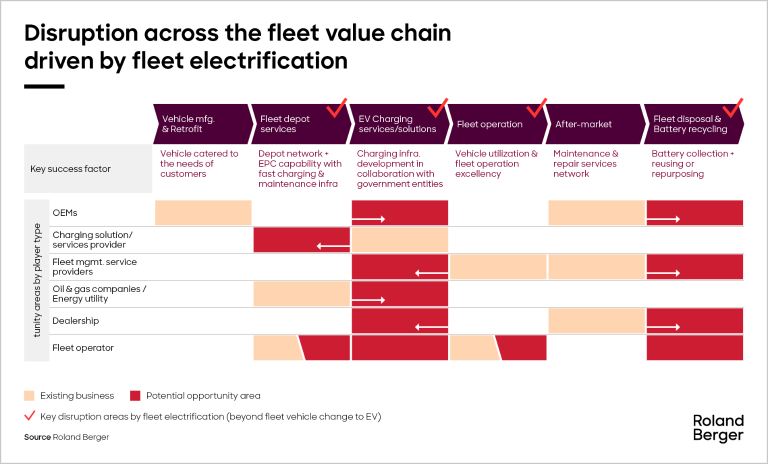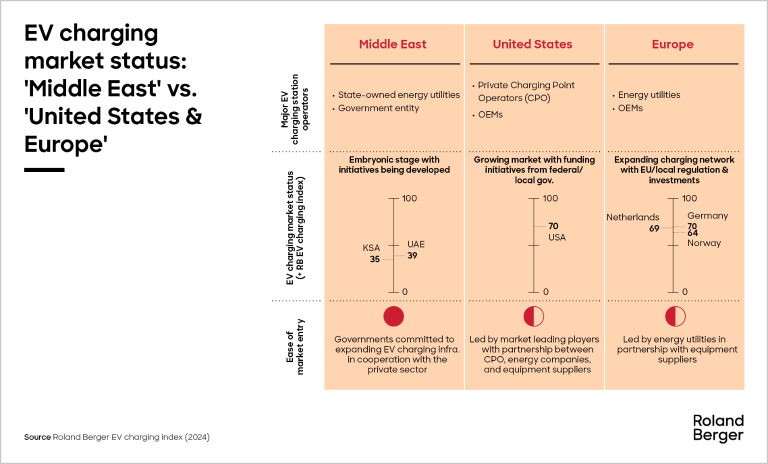Roland Berger advises companies on industrial goods and services, combining outstanding industry expertise and excellent technical know-how.


Potential business opportunity areas from fleet electrification
By Santiago Castillo and Arvind CJ
Key implications for the Middle East
As the world continues to grapple with the pressing issue of climate change, the need for sustainable transportation solutions has become more urgent than ever before. In this context, fleet electrification has emerged as a game-changer, offering significant economic and environmental benefits. According to this report, fleet electrification is set to shift gears towards a sustainable future, with e-PVs, e-CVs, and e-buses expected to reach penetration rates of 70%, 60%, and 30%, respectively, by 2040. This article explores the potential business opportunities in the Middle East across the EV fleet value chain, highlighting the region's key drivers and challenges of fleet electrification.

The Middle East is poised to become a major player in the global fleet electrification market, driven by several factors. Firstly, the region's high oil prices and dependence on fossil fuels have led to a growing awareness of the need for sustainable transportation solutions. Secondly, the increasing demand for e-commerce and last-mile delivery services has created a significant market for electric delivery vehicles. Thirdly, the region's favorable climate and geography make it an ideal location for the deployment of electric buses and commercial vehicles.
The report identifies four key areas of opportunity in the Middle East across the EV fleet value chain: fleet depot services, EV charging services solutions, fleet operation, and EV battery recycling. Let's examine each of these areas in more detail.
Fleet Depot Services:
Fleet depot services refer to electric vehicle maintenance, repair, and servicing. As electric vehicles require less maintenance than their internal combustion engine (ICE) counterparts, the demand for fleet depot services is expected to decrease. However, the report suggests that shifting towards electric fleets will create new opportunities for fleet depot services, as electric vehicles require specialized maintenance and repair services. This presents a significant business opportunity for companies in the region that specialize in electric vehicle maintenance and repair services.
EV Charging Services Solutions:
EV charging services solutions refer to the infrastructure required to charge electric vehicles. The report highlights the importance of charging infrastructure in driving the adoption of electric vehicles, as the availability of charging stations is a major concern for fleet operators. The report suggests that deploying charging infrastructure will create significant business opportunities for companies in the region that specialize in charging infrastructure solutions.
Fleet Operation:
Fleet operation refers to the management and optimization of electric vehicle fleets. The report suggests that the shift towards electric fleets will require new approaches to fleet management, as electric vehicles have different operational requirements than ICE vehicles. This presents a significant business opportunity for companies in the region that specialize in fleet management and optimization services.
"The Middle East is set to become a key player in the global EV market, driven by government incentives and OEMs' shift to EV manufacturing. With a focus on sustainability and electrification in national strategies, businesses investing in EV OEMs and charging infrastructure will have significant growth opportunities in this emerging market."
EV Battery Recycling:
EV battery recycling refers to the process of recycling the batteries used in electric vehicles. The report highlights the importance of battery recycling in driving the adoption of electric vehicles, as the recycling of batteries can significantly reduce the cost of electric vehicles. The report suggests that the deployment of battery recycling infrastructure will create significant business opportunities for companies in the region that specialize in battery recycling services.
The report also highlights the key drivers and challenges of fleet electrification in the Middle East. The key drivers of fleet electrification in the region include the high cost of fossil fuels, the increasing demand for e-commerce and last-mile delivery services, and the favorable climate and geography for electric vehicles. The key challenges of fleet electrification in the region include the high upfront costs of electric vehicles, the lack of charging infrastructure, and the limited availability of electric vehicles in the region.
To unlock the full potential of fleet electrification in the Middle East, the report suggests that the region should focus on several key areas. Firstly, the region should invest in charging infrastructure to address the lack of charging infrastructure. Secondly, the region should provide incentives to fleet operators to encourage the adoption of electric vehicles. Thirdly, the region should collaborate with international partners to access the latest technology and expertise in electric vehicle manufacturing and deployment.
The Middle East commercial vehicle market is projected to grow significantly in the coming years, with annual sales of light commercial vehicles (LCVs) and medium and heavy commercial vehicles (MHCVs) expected to increase from 2018 to 2027. This presents a potential business opportunity for companies operating in the fleet electrification sector, as the increasing demand for commercial vehicles also translates to a growing need for electric alternatives. The report highlights several potential opportunities in the Middle East across the EV fleet value chain, including fleet depot services, EV charging services solutions, fleet operation, and EV battery recycling. As the market for electric commercial vehicles continues to mature, it is expected that key adoption drivers such as the entry of major EV OEMs, decarbonization targets of last-mile delivery players, and the deployment of EV charging infrastructure will further fuel the growth of the electric commercial vehicle market in the Middle East.
Register now to access the full study and explore the key implications for the Middle East in fleet electrification, including potential business opportunities. Furthermore, you get regular news and updates directly in your inbox.





